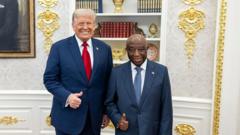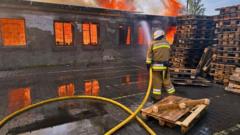Trump's recent exchanges with European leaders suggest a newfound readiness to impose further sanctions on Russia, indicating a shift in his approach to the conflict in Ukraine.
Trump Signals Shift Towards European Consensus on New Sanctions for Russia

Trump Signals Shift Towards European Consensus on New Sanctions for Russia
As European leaders exert influence, Trump appears open to stronger actions against Russia amid ongoing Ukraine war.
In the heart of an evolving geopolitical landscape, former President Donald Trump has shown signs of reconsidering his stance towards Russia's ongoing aggression in Ukraine. Following his return to the Oval Office, key European leaders have actively engaged him, applying a blend of flattery and pressure to encourage the imposition of new economic sanctions against Russia. This renewed effort comes as they seek a collaborative strategy to bolster Ukraine's defenses and promote negotiations for peace.
In recent discussions, German Chancellor Friedrich Merz and his counterparts from France, Britain, and Italy have praised Trump for his decisive action against Iran, aiming to pivot that momentum towards the situation in Ukraine. The European sides have suggested that a fresh wave of U.S. sanctions could significantly undermine Russia's economy and compel President Vladimir Putin to seriously consider negotiations. Such sanctions could curb the escalating military aggression that has characterized Russia's operations in Ukraine.
The persistent escalation from the Kremlin seems to have tested Trump's endurance with Putin. After numerous phone calls and a waning belief in Trump's ability to leverage his relationship with Putin for a peaceful resolution, these conversations highlight the growing consensus among European allies. They argue that without significant pressure in the form of sanctions, Putin will likely continue to intensify assaults, aiming to wear down Ukraine's defenses.
As the discussions evolve, the dynamics of international relations in this conflict are continually reaffirmed, with Trump's possible alignment with European demands signaling a critical juncture in addressing the dire situation in Ukraine. The forthcoming developments surrounding sanctions could reshape the landscape, showcasing potential consequences for both Russia and the broader geopolitical scenario in Europe.
As the situation unfolds, it remains to be seen how Trump will navigate these pressures and whether new sanctions will materialize to support Ukraine's defense against Russian encroachment.
In recent discussions, German Chancellor Friedrich Merz and his counterparts from France, Britain, and Italy have praised Trump for his decisive action against Iran, aiming to pivot that momentum towards the situation in Ukraine. The European sides have suggested that a fresh wave of U.S. sanctions could significantly undermine Russia's economy and compel President Vladimir Putin to seriously consider negotiations. Such sanctions could curb the escalating military aggression that has characterized Russia's operations in Ukraine.
The persistent escalation from the Kremlin seems to have tested Trump's endurance with Putin. After numerous phone calls and a waning belief in Trump's ability to leverage his relationship with Putin for a peaceful resolution, these conversations highlight the growing consensus among European allies. They argue that without significant pressure in the form of sanctions, Putin will likely continue to intensify assaults, aiming to wear down Ukraine's defenses.
As the discussions evolve, the dynamics of international relations in this conflict are continually reaffirmed, with Trump's possible alignment with European demands signaling a critical juncture in addressing the dire situation in Ukraine. The forthcoming developments surrounding sanctions could reshape the landscape, showcasing potential consequences for both Russia and the broader geopolitical scenario in Europe.
As the situation unfolds, it remains to be seen how Trump will navigate these pressures and whether new sanctions will materialize to support Ukraine's defense against Russian encroachment.






















